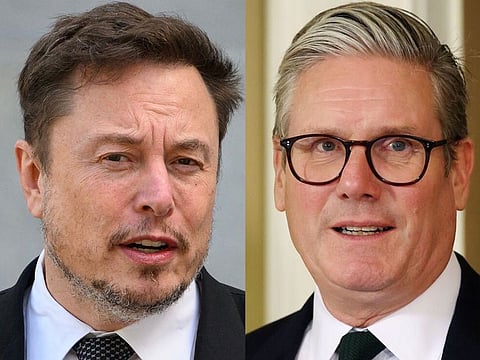Musk's digital war with Labour shakes UK politics
Tesla boss’ influence fuels UK’s political turmoil as Labour fights back

Elon Musk, the world’s richest man, has long been a polarising figure in global politics. This January, as Donald Trump reassumed the US presidency, Musk’s shadow loomed large over another political drama — this time in Britain.
Earlier in October 2024, Labour’s decision to exclude Musk from its flagship business summit at Guildhall sparked quiet but significant ripples.
Musk’s subsequent actions, including his growing ties to far-right movements like Reform UK and his vocal criticisms of Labour, have placed the party in the crosshairs of a broader geopolitical struggle involving the digital realm.
As Trump’s return to power signals a new era of populism, Musk has increasingly positioned himself as a digital ally to right-wing movements, leveraging his platform, X, to amplify far-right narratives.
This alliance extends beyond the US; Musk’s growing support for Reform UK, which has earned the only government verification tick on X, underscores his expanding influence in British politics.
The platform’s algorithmic changes have systematically amplified conservative voices while suppressing progressive narratives, according to independent researchers and digital rights organisations.
Musk’s Influence: Testing Labour’s Resilience
Musk’s controversial interventions in British politics have intensified in recent months. His remarks on issues like grooming gangs and his critiques of Labour’s handling of the issue were direct provocations. Musk accused Keir Starmer of complicity in criminal activities, unleashing rhetoric designed to stir division.
Yet Labour maintained its focus on evidence-based policy responses, with Health Secretary Wes Streeting dismissing Musk’s claims as “misguided and misinformed.”
This strategic defiance represents Labour’s broader political philosophy: a commitment to rational debate and democratic norms rather than succumbing to the chaotic, attention-grabbing style that Musk often employs. However, this approach carries risks. Musk’s control over X, with its 50-100 million European users, allows him to influence public opinion at scale.
His recent actions demonstrate his willingness to back populist causes that challenge the established order. The platform’s reach extends far beyond its immediate user base, as traditional media outlets frequently amplify X’s trending topics and viral content, creating a ripple effect across the broader media landscape.
Dilemma of Navigating Digital Populism
For Labour, this new digital era presents a formidable challenge. While Technology Secretary Peter Kyle views Musk’s influence as an “unignorable force,” the Labour Party remains resolute in its opposition to Musk’s populism.
This tension raises a crucial question: can politicians engage with figures like Musk without compromising democratic values? While some Conservative figures have openly entertained Musk’s potential as an ally, Labour has staked its position on preserving democratic integrity and prioritising evidence-based policy over sensationalism.
Musk’s growing influence on far-right movements has created what European regulators call a “feedback loop of extremism,” facilitated by his platform X. In the UK, his endorsement of Reform UK extends his political reach, amplifying populist rhetoric.
Reform UK’s rising prominence, backed by Musk’s support and its unique verification status on X, demonstrates his ability to reshape political landscapes and challenge democratic norms.
Recent polling suggests that Reform UK’s social media presence has contributed to a notable surge in support among younger voters, traditionally a demographic less aligned with right-wing politics.
This alignment with Reform UK marks a broader strategy by Musk to champion digital populism, using his platform to elevate fringe political movements and challenge the political mainstream. His intervention comes at a critical juncture in British politics, as traditional media outlets struggle to maintain their influence amid declining readership and increasing digital competition. By aligning with Reform UK, Musk has inserted himself into the heart of the UK’s political conversation, challenging Labour’s vision for a more inclusive society.
Future of Democracy in a Digital Age
As the political landscape evolves, the tension between Labour’s commitment to democratic norms and Musk’s growing digital influence intensifies. Labour’s resistance to Musk’s attempts to shape political discourse has thus far maintained the party’s principled stance.
However, the scale of his influence presents an ongoing challenge to Labour’s ability to protect democratic values in an increasingly digital world. The party faces mounting pressure to develop more sophisticated digital strategies while maintaining its commitment to truthful, evidence-based communication.
In the coming years, Labour’s ability to navigate this terrain will be crucial in determining the future of democratic governance in the UK. As Musk’s influence over far-right movements expands, the risks to democratic institutions grow.
His digital empire, exemplified by X’s reach and his backing of parties like Reform UK, has the power to alter political dynamics in ways that traditional institutions struggle to counter. The platform’s ability to rapidly disseminate information — or misinformation — poses unprecedented challenges to electoral integrity and democratic discourse.
The question remains whether Labour’s strategy of resisting Musk’s influence will ultimately lead to lasting reforms that safeguard representative governance, or whether the growing power of tech billionaires like Musk will fundamentally reshape the political landscape.
What is clear is that the digital duel between Musk and Labour is just beginning, and its outcome could define the future of constitutional order in the digital age.
Ashraf Nehal is a postgraduate scholar of South Asian Geopolitics, School of Oriental and African Studies (SOAS), University of London
Sign up for the Daily Briefing
Get the latest news and updates straight to your inbox



